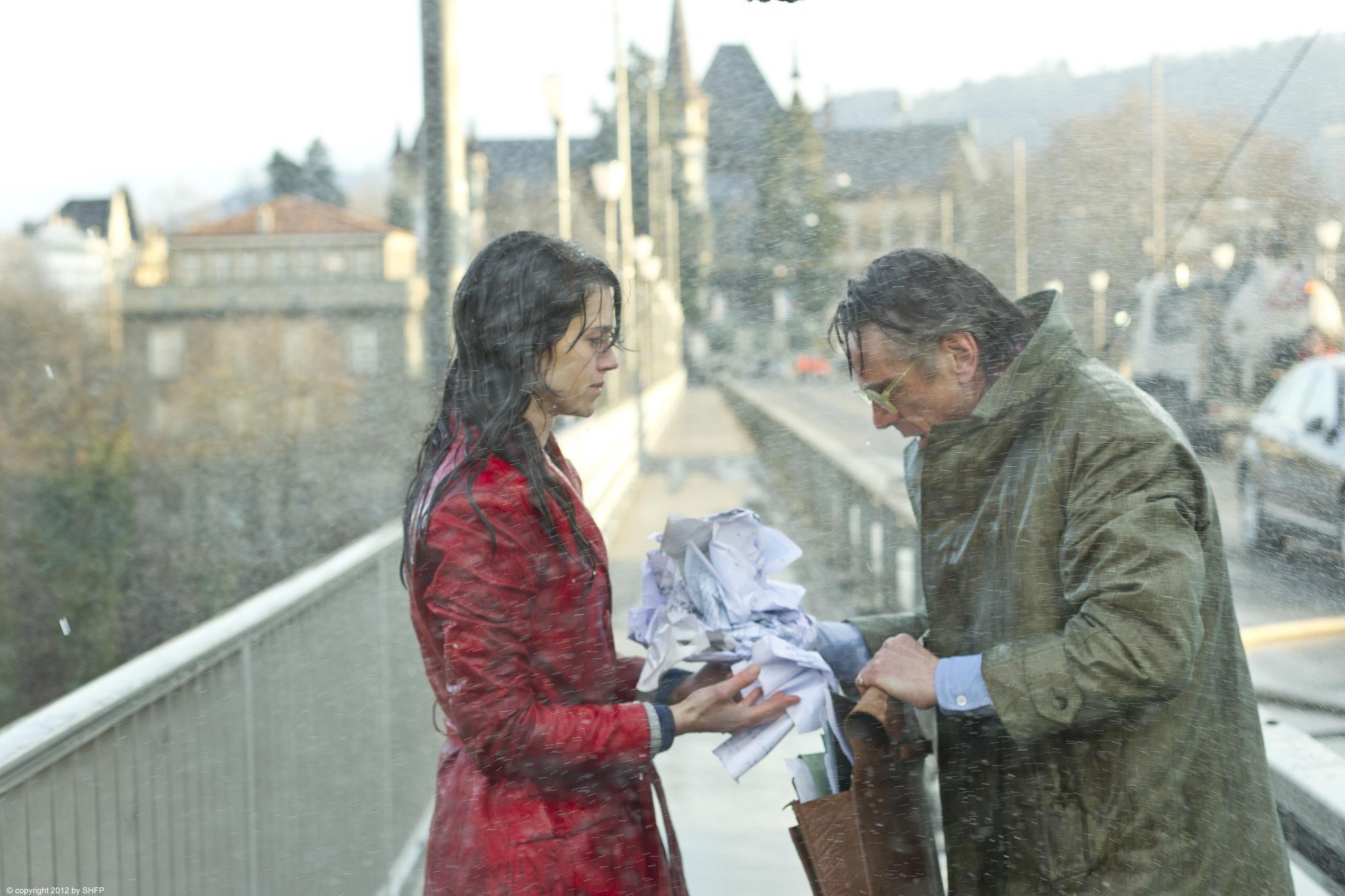By Chlotrudis Independent Film Society
Rating: 3 cats
Director: Bille August
Starring: August Diehl | Bruno Ganz | Jack Huston | Jeremy Irons | Lena Olin | Martina Gedeck | Mélanie Laurent | Tom Courtenay

Country: germany, portugal, switzerland
Year: 2013
Running time: 111
IMDB: http://www.imdb.com/title/tt1654523/combined
Jason says: “Sometimes, there are things that the written word can do that a film can’t. In NIGHT TRAIN TO LISBON, Raimund Gregorius (Jeremy Irons) tells how certain sentences in the book at the film’s center had a profound effect on him, but even with Irons’s fine voice… Well, they’re nice sentences, but they don’t have the direct connection to our brain that they do for him. And then, as Raimund’s search for the source of those words plays out, there’s a sense that it, too, may have been more absorbing in print.
“The book in question comes into Gregorius’s possession when the professor at a Bern preparatory school prevents a young woman from jumping off a bridge. She soon disappears, but leaves her coat behind, in which he finds a small book and a train ticket to Lisbon. He impulsively takes the train, reading the book along the way, and by the time he reaches Portugal, is just as fascinated by Amadeu Almeida de Prado (Jack Huston), the man who wrote it during the revolution forty years ago, as he is by the young woman he started out following.
“There are three things going on here with the potential to be interesting stories – the tale of how a privileged young man like Amadeu becomes involved with the revolution and a spy by the name of Estefânia (Mélanie Laurent) with a photographic memory who is involved with Jorge O’Kelly (August Diehl), his best friend from school; the mystery of who the girl whose life he saved is and why this book affected her even more than it did him; and how Gregorius searching for these answers may help him break out of his tweedy shell, especially with the aid of Mariana (Martina Gedeck), the optician who helps him in this quest in part because her uncle João (Tom Courtenay) was involved in the revolution. The trouble is that somewhere along the line, be it in Bille August’s direction, the screenplay by Greg Latter & Ulrich Herrmann, or Pascal Mercier’s original novel, the emphasis seems to shift between Bern and Lisbon. A great mystery is initially posed, with a nameless girl, a trail of clues to be followed, and the train of the title, which certainly sounds more exciting than a quick flight, because trains are romantic.
“Once there, though, Gregorius has immersed himself in the book, and the girl seems forgotten. And while that’s perhaps necessary – for all the intrigue she’s created, she’s a bit of a dead end – we don’t fall in love with Amadeu’s story the way Gregorius does. We get flashbacks as they serve the film rather than immersing ourselves in Amadeus’ story, and we actually hear relatively little of his voice. There’s one nice speech in high school, and a few lines that Gregorius quotes that, honestly, have the air of someone trying to sound literary but winding up off the mark. On top of that, just as Amadeu’s story is presented out of order and piecemeal, Raimund’s quest to learn more about him seems to be assisted and stymied for what seem like arbitrary reasons.
“On the plus side, this English-language movie about a Swiss academic (played by an Englishman) who travels to Portugal does have the sort of cast that is certainly worth one’s attention even with flawed material. Jeremy Irons, for instance, plays Raimund Gregorius as initially boring but also quietly despairing of it, with hints that there are the makings of a passionate man there to be teased out, and does it in such a way that the lively and academic are not opposing forces. Granted, some of that work is accomplished by a new pair of glasses and the one who makes them (the addition of a good woman to one’s life can make things clearer), and Martina Gedeck draws that out nicely as Mariana. The youthful cast in the 1973 scenes – Jack Huston, Mélanie Laurent, August Diehl, Marco D’Almeida, Beatriz Batarda – are a fine group, and Nicolau Breyner proves a fearsome opposing force to them. Even better, though, are the older actors in the present day who get to reminisce and tell stories, a fantastic line-up that included Charlotte Rampling, Christopher Lee, Tom Courtenay,Bruno Ganz, and Lena Olin. They’ve each been carrying something that lingers into the flashbacks they introduce.
“Director Bille August is thankfully wise enough to see that when all a scene needs is Rampling or Lee talking, he should get out of the way. He also makes impressive use of his locations – while in some ways Lisbon is an old city that has not visually changed that much in forty years, it feels different in the present-day scenes and the ones under the dictatorship. He also makes good use of the structures of both Lisbon and Bern, with plenty of scenes showing Gregorius crossing water on either a bridge or a ferry, separated from where he needs to be. It’s pretty, too.
“Since none of the constituent parts of the film are bad, I wonder if a sales job and opening act that positioned NIGHT TRAIN TO LISBON as a thriller hurt it. The filmmakers may set up a mystery, but suspense over the ultimate fates of Amadeu, Estefânia, and the girl who starts it all seldom seems to be their primary goal. It’s got other problems, but it’s also got a good cast going for it. 3 cats
“Seen 3 December 2013 at the Regent Theatre (Gathr Previews Presents, digital)”
